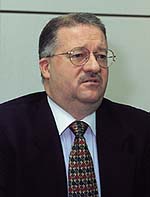Do you think accounting should have international standards?
|
If you compare current Japanese and the U.S. audit practices, it takes
more than six times longer to complete an audit in the U.S. Even if Japan
tries to apply strict audit standards such as in the States, it would not
occur overnight. Japan lacks both practicing attorneys and certified
public accountants. Although there is much debate on the "big bang" in
Japan, there has been no detailed discussion regarding time frame and type
of training necessary to achieve the auditing level that is standard in the
U.S.
|

Unless Japan improves its auditing system in a broad sense, as a system
of checking a variety of legal and financial transactions performed in Japan
these will not be recognized by other countries. Do you think this is
true?
|
Since you cannot check whether transactions have complied with the law,
many dubious transactions take place. If we take, for instance, the
securities houses in the U.S., attorneys are obligated to submit a written
opinion as to whether companies are disclosing information according to the
Securities and Exchange Law. In Japan, an in-house legal department, which
has direct interest in that company, takes part in the audit, and so lacks
the independence to protect the rights of stockholders. This is also
apparent when reviewing bank loans to companies. If we really want to
fulfill Japan's legal needs, we must rapidly increase the population of
practicing attorneys or, better yet, expand the legal profession as a whole. There would be plenty of work for all us.
|

As the world becomes increasingly globalized, it will be necessary to
allow foreign attorneys to actively practice in Japan. Do you think this
statement is true?
A It is possible that some may have the concept that if gigantic law firms
from abroad arrive in Japan, existing law firms could not compete in the
same arena. However, this is not the case. Even in the twelve years since
the gate for foreigners was opened, there has not been that much of an
increase in foreign attorneys practicing in Japan. There are probably only
seventy or eighty registered practicing attorneys that are actually actively
conducting business in Japan. Even if it were to be completely liberalized,
I don't think there would be that much of an increase in numbers. Instead,
the way to look at it is that if Japan liberalizes the legal profession,
there is a possibility that a Japanese attorney would one day become a
partner in a renowned law firm as a world class attorney. If you think in
those terms, I think the idea should be welcomed. To improve Japan's
professional legal standing in the world, I would hope that they will soon
accept foreign attorneys as true equals.
Interviewer: Mr. Katsuo Sorimachi, Chairman of the Tokyo Legal Mind
|

 |
Mr. Grondine received his BA from Dartmouth College in 1974. In 1980, he
received a JD from Boston University Law School and was admitted to the New
York and Massachusetts State Bars in 1981. In 1990, he was admitted to the
California State Bar and in 1991 to the District of Columbia Bar. In 1993,
he registered in Japan as a Gaikokuho Jimu Bengoshi [Administrative Attorney
Practicing Foreign Law]. He has served as the Chairman of the Legal
Services Committee, a Member of Board of Governors, Vice President and
Advisor to Board of Governors for the American Chamber of Commerce in Japan,
Chairman of the Tokyo Chapter for the International Law Section of the New
York State Bar Association, Co-chairman of Bar Relations in Asia of the
Association of the Bar of New York City and a lecturer on international
taxation at the National Tax College of Japan. He is the author of Foreign
Law Firms Thwarted in Japan (International Financial Law Review) Corporate
Strategies for Japan (co-author, Oyez Longman Publications) and has written
numerous articles on Japanese leveraged leasing and other aspects of
Japanese law and business practices.
|
|
